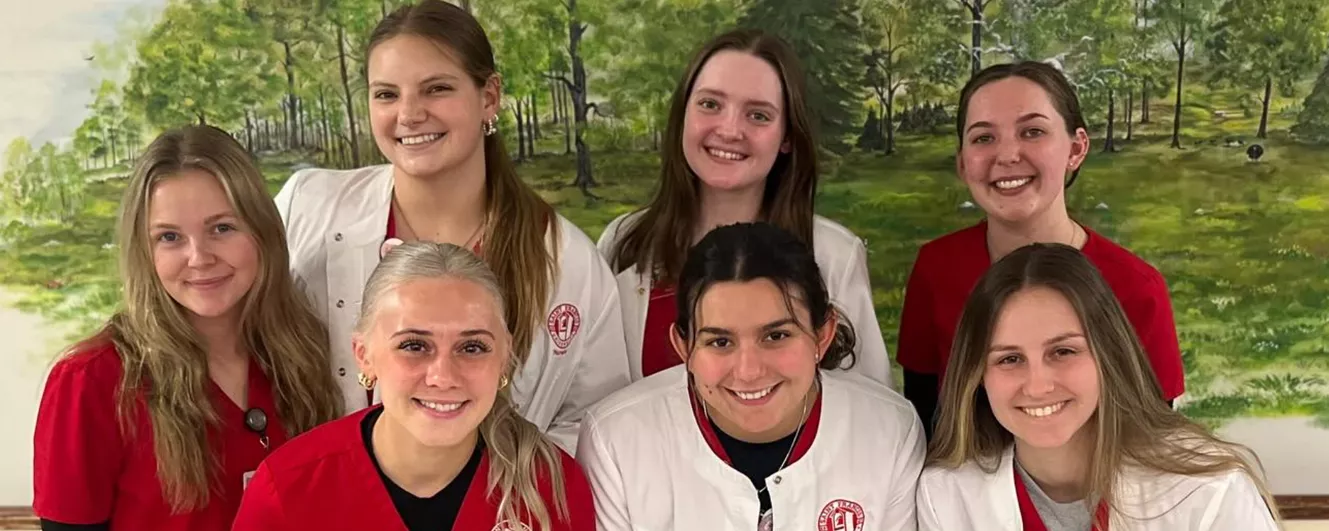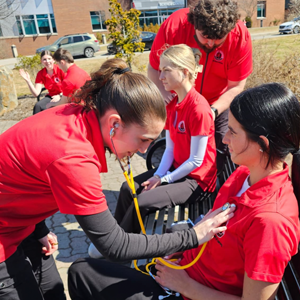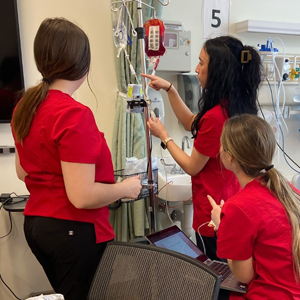
SCHOOL OF HEALTH SCIENCES AND EDUCATION
DEPARTMENT OF NURSING
CARE, LEAD, INSPIRE
The SFU Nursing Portfolio
Our comprehensive suite of undergraduate and graduate nursing programs offered through the Department of Nursing position science, healthcare practice and ethics at the core of the nursing curriculum at every level of study.
Graduate - Undergraduate - Online - On Campus
- Highly respected nursing programs for every stage of your career
- Most affordable online FNP programs in the state
- Personal attention from faculty recognized as innovators in the field of nursing
- State-of-the-art tech & skill-building labs
- Accredited by the Commission on Collegiate Nursing Education (BSN and MSN FNP programs)
Mission and Goals
Misson
The Department of Nursing (DoN) inspires students to dedicate themselves to service, leadership, critical self-reflection and life-long learning in the Spirit of Franciscan values. The Nursing Programs challenge students in the application of clinical reasoning, cultural competence, patient care technologies and interprofessional collaborative practice within an evidence-based approach while providing safe and quality care to individuals, families, groups, communities, and populations across both the lifespan and the continuum of complex, changing healthcare environments. Through graduate education, the Nursing Program provides its students with advanced knowledge and higher-level leadership skills for improving health outcomes and elevating patient care in various roles and settings.
BSN Nursing Program Goals
- Provide a liberal arts foundation in the Judeo-Chrisitan tradition which emphasizes critical reflection and cultivates professional nursing values and diverse perspectives.
- Provide an education program based on the AACN Essentials of Baccalaureate Education for Professional Nursing Practice.
- Provide dynamic educational opportunities in preparation for interprofessional nursing practice and leadership.
- Provide a foundation for graduate study
MSN Program Goals
The Master of Science program in nursing is designed to achieve the following goals:
- Augment the potential of bachelor’s prepared professional nurses to strengthen and improve health care by providing graduate level educational opportunities in advanced practice, education, and leadership.
- Elevate the educational levels of nurses in the health care workforce by offering preparation for advanced practice roles in nursing.
- Prepare nurses for doctoral level study.

Chart Your Course
Graduate Nursing
- Family Nurse Practitioner Programs (Online*)
SFU's MSN / FNP PMC programs have one of the most affordable tuition rate in Pennsylvania!
Undergraduate Nursing
- Nursing BSN Traditional (On-Campus)
- BSN Second Degree Track (On-Campus)
*Online with Clinical Components
About the Department of Nursing
The Department of Nursing inspires students to dedicate themselves to service, leadership, critical self-reflection and life-long learning in the Spirit of Franciscan values. Nursing programs are offered under the auspices of the School of Health Sciences and Education.
Department Chair: Dr. Kimberly Forst, kforst@francis.edu, 814-472-3027

Dedicated to a Holistic Approach to Nursing
Our nursing programs position science, healthcare practice and ethics at the core of the nursing curriculum. Our teaching philosophy is to assist you to develop clinical expertise and critical thinking skills within a Judeo-Christian ethical perspective that will strengthen you for the emotional and moral challenges of this caring profession.
- We offer both undergraduate and graduate paths to help you meet your evolving career goals.
- Hands-on learning experiences and top-notch technology are available through the Experiental Learning Commons.
- Students are assigned a faculty advisor for the duration of their studies at SFU.
- Our graduates consistently surpassed National Pass Rates, achieving an average score of over 90% on the NCLEX-RN Exam.
- Our FNP is the most affordable in Pennsylvania.
Saint Francis University is Changing the Way Nurses Learn
The unique, interprofessional curriculum offered at Saint Francis University has resulted in more well-prepared nurses who are entering the field sooner.
Experiental Learning Commons
The new Health Science Experiential Learning Commons is a 10,000-square-foot structure that provides state-of-the-art classroom, laboratory, and clinical education space to instruct students enrolled in Health Sciences programs. Key features of this facility include an enhanced simulation center, skills lab and the addition of a simulated apartment.

Interprofessional Education
Nursing students practice working across disciplines alongside students in other majors, just as they will in real-life scenarios.

Franciscan Values
Franciscan values are embedded into the curriculum, ensuring we graduate caring, ethical nurses.

International Student policy for all Nursing Programs/Tracks:
Due to the high-level language competency required in nursing, international applicants must possess proficiency in English at a level to enable them to succeed all nursing programs. All international applicants are required to submit results from either the Test of English as a Foreign Language (TOEFL), International English Languale Testing System (IELTS), or Duolingo English Test (DET)
- TOEFL: A minimum score of 100 is required. The expected breakdown is as follows: Reading 25, Listening 25, Speaking 25, Writing 25.
- IELTS: A minimum combined score of 7.0 is required wit each subsection score of at least 7.0.
- DET: A minimum score of 125 is required.
- International applicants include those with English as an additional language and/or applicant with a permanent resident card
- International applicants must be able to have a USA state driver’s license to get to and from clinicals.
ACCREDITATION NOTICE
The baccalaureate degree and master's degree program in nursing at Saint Francis University are accredited by the Commission on Collegiate Nursing Education (http://www.ccneaccreditation.org).
The Post Master's Certificate Family (Individual Across the Lifespan) Nurse Practitioner program at Saint Francis University is pursuing initial accreditation by the Commission on Collegiate Nursing Education (http://www.ccneaccreditation.org). Applying for accreditation does not guarantee that accreditation will be granted.
The Saint Francis University Nursing Department will host an accreditation visit by the Commission on Collegiate Nursing Education (CCNE) on March 9, 10,11, 2026. CCNE will be conducting an on-site evaluation of our baccalaureate degree program in nursing, master's degree program in nursing, and Post-Graduate Advanced Practice Registered Nurse (APRN) Certificate program in nursing. In accordance with CCNE's procedures, the Commission provides the opportunity for program constituents and other interested parties to submit, in writing, third-party comments concerning our programs' qualifications for accreditation. Third-party comments must be received at least 21 days prior to the scheduled visit on March 9, 2026.
If you would like to provide comments to CCNE, please email them to the CCNE Online Community (thirdpartycomments@ccneaccreditation.org) no later than Monday, January 26, 2026.



